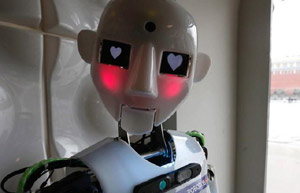China is already the world's biggest industrial robot market in terms of sales volume, overtaking Japan. The CRIA said a fifth of global industrial robots, or 36,860 units, were sold in China in 2013. Annual shipments jumped by more than 40 percent year-on-year last year.
Overseas vendors increased their sales by 18.6 percent compared to a year ago while Chinese companies grew their shipments by five times, said the CRIA report.
Sun Lining, president of Suzhou Boshi Robotics Technology Co Ltd, is also optimistic about the future.
"German and Japanese vendors may be the dominant players in the automobile manufacturing sector. But they will not be able to cover thousands of other industries that need robots in lieu of human capital," Sun said.
Boshi, established in 2009, mainly produces glaze-spraying robots for high-end bathroom supplier makers. Unlike automobile assembly, glaze-spraying robots have lower precision requirements but similar reliability.
"Chinese companies must acknowledge the technology gap with global industry leaders and focus more on showcasing their strengths. They should concentrate on the lower-end of the market and build up scale to challenge overseas players," Sun said.
Boshi is looking at turnover of 100 million yuan ($16 million) in the next two years, he said, adding that the company is working on next-generation products that are capable of undertaking more sophisticated jobs.
While companies mull various strategies to tap the market, there is no doubt that it is China's role as the world's factory that is paving the way for wide usage of industrial robots. That also explains, to some extent, why most of the leading global robot makers are focusing on automobile assembly and other high profit margin industries.
Buyers of less-sophisticated robots, including small commodity makers, logistics companies and electronic equipment vendors, are target customers for Chinese companies, experts said. With human capital costs increasing in China, many industries are turning to robotic product lines to save costs. High productivity and quality are other factors that are prompting more Chinese companies to use robots, instead of actual workers.
"If the cost of buying a robot is lower than the workers' salary, most company owners will use machines rather than humans. It's really simple mathematics for them," said Sun.
Terry Gou, founder and chairman of Taiwan-based Foxconn Technology Group, said last month that robots "are an important means to restructure labor resources".
Foxconn, the world's largest contract electronics manufacturer, said it hopes to free workers from tedious manual labor by ratcheting up automation in production. The company launched a "robot strategy" in 2010, aiming to put millions of robots into use. Some of its robotic arms have already been put into use in factories on the Chinese mainland. However, the company also hires about 1 million workers for making popular consumer electronic devices like Apple Inc's iPhone 6 and 6 Plus.
 |
 |
| Top 10 amazing robots in the world | Over 30 robot factories under construction in China |
